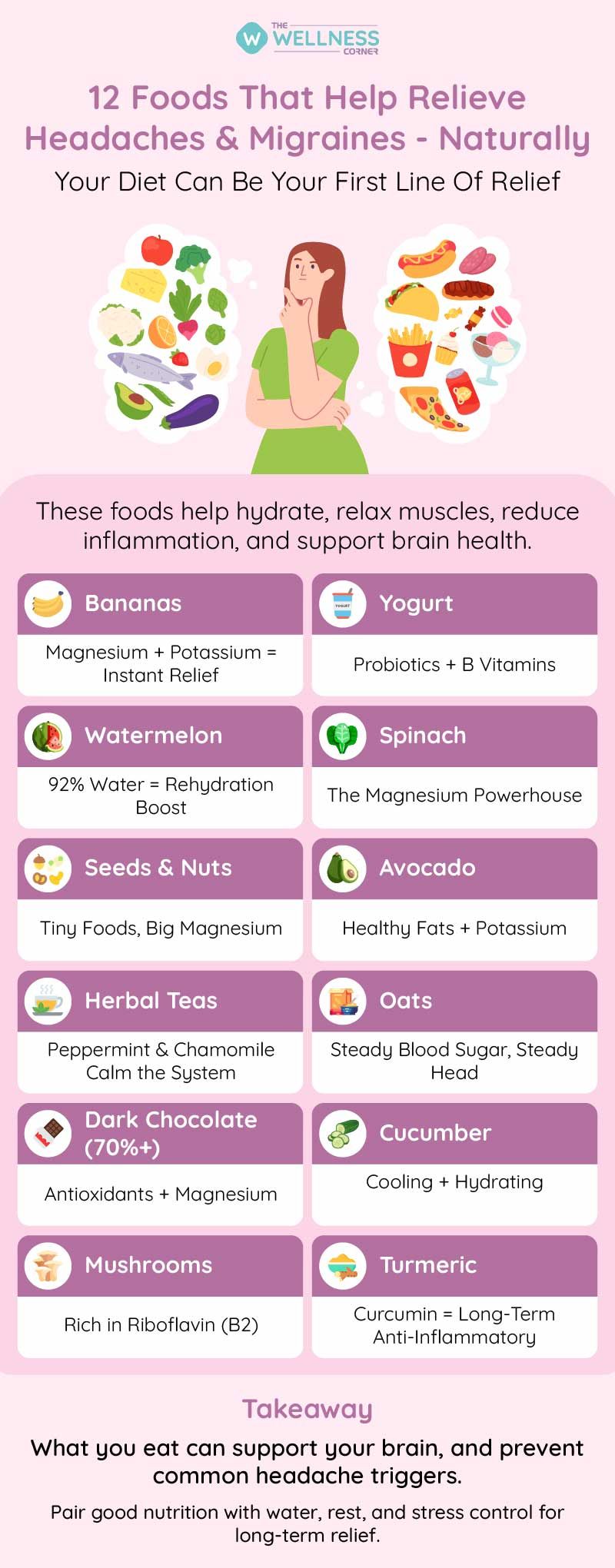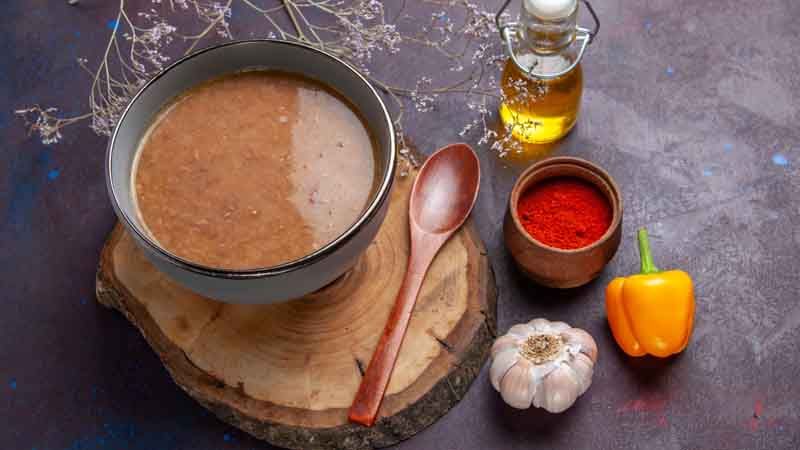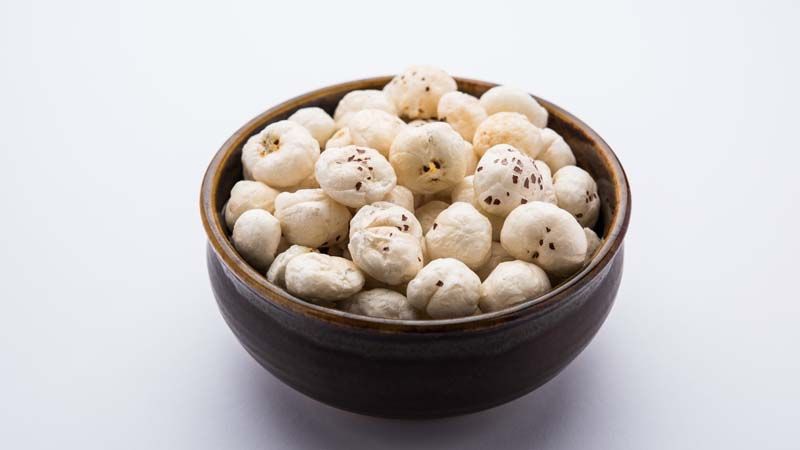12 Foods To Help Get Rid Of A Headache Or Migraine Attack Naturally
- 10 hours ago
Headaches can hit at the worst possible times - during work, while traveling, or even when you're trying to relax. Migraine attacks can be even worse, bringing nausea, sensitivity to light, and pulsating pain. While medications are helpful, they’re not always ideal for frequent use. That’s where food steps in as a powerful natural remedy.
Yes, what you eat can either trigger or relieve headaches. By choosing the right foods, you can ease inflammation, replenish important nutrients, support healthy brain function, and even prevent future migraine attacks.
Let’s look at 12 natural foods that may help relieve headaches and migraines - especially when paired with proper hydration, rest, and stress management.
Also Read: Why You Experience Headaches on an Empty Stomach?
1. Bananas - The Natural Electrolyte Boost
Bananas are one of the best quick-fix options when you feel a headache coming on. They're loaded with magnesium and potassium, two minerals that help relax muscle tension and support nerve function. Low magnesium levels have been directly linked to an increased risk of migraines.
Bananas are also great for people who wake up with a headache after skipping meals, thanks to their natural sugars and energy-boosting power.
How To Eat?
As is, blended into a smoothie or sliced onto oats.
2. Watermelon - Rehydrate & Refresh
Many people don’t realize that not staying hydrated can lead to headaches. Even slight dehydration can lead to a tension headache. Watermelon comes to the rescue with its high water content (about 92%), helping you rehydrate naturally while also providing vitamins A, C, and magnesium.
It also contains natural sugars and electrolytes that help restore balance in your body, especially during hot weather or after exercise.
Tip: Eat chilled watermelon cubes or make a refreshing watermelon-mint drink.

3. Seeds And Nuts - Small But Mighty
Pumpkin seeds, sunflower seeds, almonds, walnuts - these tiny foods are big on nutrients. They contain magnesium, healthy fats, and fiber, all of which help fight inflammation and regulate blood sugar levels. A lot of people aren’t aware that dehydration can be a hidden cause of headaches.
Many migraine sufferers have low magnesium levels, and adding magnesium-rich seeds and nuts to your daily routine could be beneficial.
How To Eat?
Sprinkle them on salads, add to smoothies, or grab a handful as a snack.

4. Herbal Teas - Sip Your Way To Relief
When it comes to headaches, not every tea offers the same relief. Caffeinated teas may trigger headaches in some people, but herbal teas like peppermint and chamomile are soothing and healing.
- Peppermint tea has a cooling effect and helps reduce muscle tension and sinus pressure.
- Chamomile tea has calming properties, reduces inflammation, and can improve sleep - all important for migraine prevention.
Drink this: Warm with a dash of honey, especially before bed or during early headache signs.
Also Read: Green Tea For Busting Stress- Benefit You Might Not Be Aware Of
5. Dark Chocolate (In Moderation) - Sweet Relief
Surprisingly, dark chocolate can actually help relieve headaches for some people. It contains high levels of magnesium and antioxidants that support blood vessel relaxation and help lower inflammation.
However, for others, chocolate may be a trigger - so it’s important to observe how your body reacts. If it works for you, a square or two of dark chocolate can be a guilt-free way to relieve stress and ward off a headache.
Tip: Opt for dark chocolate that contains a minimum of 70% cocoa and is free from added sugars.
6. Mushrooms - A Fungi With Benefits
Mushrooms are a great source of riboflavin (vitamin B2) - a nutrient known to reduce migraine frequency and intensity. Riboflavin supports energy production in brain cells, which is essential for those prone to migraines.
Additionally, mushrooms contain antioxidants and anti-inflammatory compounds that may support overall brain health.
Try this: Sauté mushrooms with garlic and spinach or add to your breakfast omelet.
7. Yogurt - Probiotic Power
Yogurt offers a double benefit - it’s high in riboflavin and contains probiotics that support gut health. There's a strong connection between gut health and migraine risk. If your digestive system isn’t functioning properly, it can trigger inflammation that may lead to headaches.
Probiotic-rich yogurt also helps your body absorb magnesium and B vitamins more effectively.
Best choice: Go for unsweetened, plain Greek yogurt and add fresh fruit or seeds.
8. Spinach - A Leafy Green Lifesaver
Spinach is a headache-fighting superhero. It’s rich in magnesium, folate, and potassium - all of which help reduce blood pressure and improve blood flow to the brain. It also contains vitamin B2 and iron, which are important for maintaining healthy oxygen levels in the blood.
Why It Matters?
When your blood vessels are constricted or you're lacking in key nutrients, headaches often follow.
Add it to: Smoothies, salads, soups, or cook it with other veggies.
9. Avocado - Healthy Fats That Heal
Avocados are rich in healthy fats, potassium, and magnesium, essential nutrients that boost brain health and may help reduce the risk of headaches. They help regulate blood pressure and reduce inflammation, and their healthy fat content helps keep you full, avoiding sudden dips in blood sugar that can lead to headaches.
Quick fix: Spread avocado on toast, toss it in salads, or blend it into a smoothie.
10. Oats - The Blood Sugar Stabilizer
A common cause of headaches is skipping meals or eating sugary foods that spike and crash your blood sugar. Oats are a great source of complex carbohydrates that release energy slowly and keep your blood sugar levels stable.
They also contain magnesium and vitamin B6, both of which are important for nerve and muscle function.
Eat it as: A warm bowl of oatmeal topped with a banana and a spoonful of seeds or nuts.
11. Cucumber - The Cooling Healer
Just like watermelon, cucumber is mostly water and helps with hydration. But it also contains anti-inflammatory flavonoids and antioxidants that help reduce headache-causing inflammation.
Bonus: Its cooling effect is also refreshing when you feel overheated, stressed, or lightheaded.
Try this: Slice into salads, blend into juices, or eat with a dash of rock salt and lemon.
12. Turmeric - Anti-Inflammatory Gold
Turmeric contains curcumin, a powerful natural agent that helps reduce inflammation. While it won’t provide instant relief, regular use of turmeric may help reduce the frequency and intensity of chronic migraines over time.
Use in: Golden milk, curries, or mixed with warm water, honey, and black pepper (to boost absorption).
Final Thoughts
There’s no magic cure for headaches or migraines, but what you eat can make a massive difference. Including these nutrient-rich foods in your daily meals can help support brain health, reduce inflammation, improve hydration, and prevent common triggers like blood sugar drops or magnesium deficiency.
Have doubts about your diet? Consult a dietitian at "The Wellness Corner" today - Click Here
Everyone is different, so it’s a good idea to keep a food and headache journal to find out what works best for you. Combine good nutrition with stress management, proper hydration, and enough sleep for the best results.









